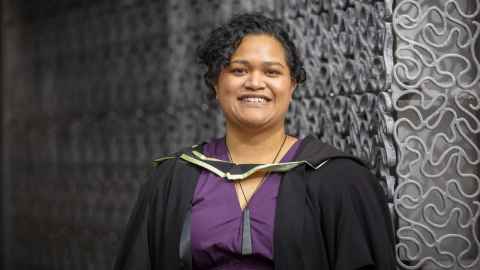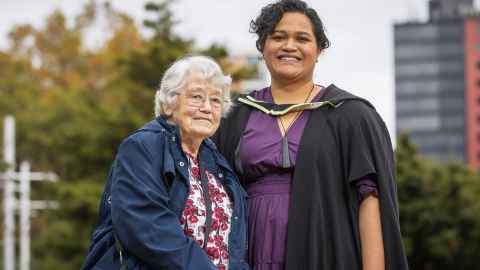New job takes Masters graduate home
16 May 2024
Masters of Urban Planning graduate Arizona Haddon says her passion and interest in placemaking began as a child.

Arizona Haddon graduated from Waipapa Taumata Rau, University of Auckland on 14 May with a Masters of Urban Planning (Professional) receiving first class honours.
As a young child growing up in Tāmaki Makaurau, Haddon said frequent visits to different neighbourhoods across the city stoked her passion and interest in placemaking.
She spent a lot of time with her grandparents during her formative years; her maternal grandparents lived in Browns Bay, while her father’s parents were one of the few Pacific Island families still living in central Auckland in Mt Eden during the early 2000’s.
“The rest of my family were mostly spread across Tāmaki Makaurau and I have memories of visiting relatives in different parts of the city. I think my interest in placemaking stems from being a child and seeing all these different neighbourhoods, and the kinds of communities that lived there.”
Given the diversity of her own whānau (Ngāti Hauā in the Waikato through her mother, and the villages of Musumusu (Upolu) and Lu’ua (Savai’i) in Sāmoa through her father) Haddon's interests around why certain groups of people lived in specific communities, fuelled her university studies.
Housing inequity has long been an issue for her, she says the experience of studying at postgraduate level has given her tools to question and interrogate the current status quo.
“I think the biggest highlight has been having the opportunity and the tools to interrogate something that doesn’t sit right with you. For me, that has been housing inequity and later the intersection between Te Tiriti o Waitangi, local government, and planning issues.”
She studied Sociology as an undergraduate student at Te Kunenga ki Pūrehuroa, Massey University, before embarking on Urban Planning postgraduate studies at the University of Auckland.
Aside from the constant challenge of juggling multiple commitments, Haddon says she experienced a kind of ‘climate depression’ during the beginning of her Masters.
“I took a resource management law paper and an environmental planning paper in the same semester. Together, they drove home the extent of irreparable damage that has been done to our whenua and taonga by poor development practices, and the politicised nature of decision making that sits behind it all.”
I thought maybe if I understood the system better, I might one day be in a position to make a positive difference to it.

“I remember feeling very hopeless about the state of our planet and a lot of grief for the whānau that are bearing the brunt of this crisis.”
The rollercoaster journey was life-changing, not only because of the valuable new connections made, but also because it led to a new position as a District Planner with the Thames-Coromandel District Council.
“It is exciting and varied work that I am well supported in. I’m really enjoying learning about the Waikato region where my whānau are originally from. This place is rich in whakapapa, you can just tell from its extraordinary landscapes.”
She credits both of her grandmothers, Judith Haddon and Siulagi To’oala, as great sources of motivation. Neither had the opportunity to study past high school, yet they both impressed on her the value of education, particularly for women.
“Both of my grandmothers have been integral to me actually completing my degrees. They’ve been my sounding boards, carers, and uplifters.”
She recalls approaching the finish line of her undergraduate degree, and becoming more self-conscious about a lack of understanding of the system she was criticising.
“I think that’s my Samoan upbringing – we’re generally taught not to open our mouths until we’ve listened to all the different points of view.”
She pressed on, deciding to keep ‘following her nose’ and applied to study the Master’s degree in Urban Planning.
As a recipient of the 2022 Kupe Leadership Scholarships, Haddon says having that financial burden alleviated cemented her decision to keep studying.
“I thought maybe if I understood the system better, I might one day be in a position to make a positive difference to it.”